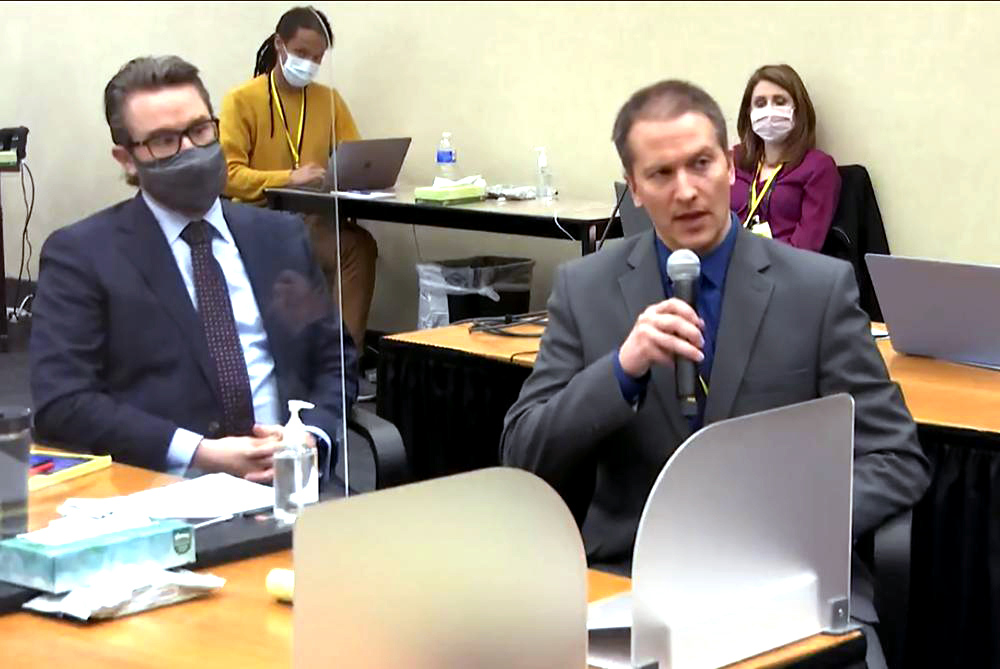Edited by: TJVNews.com
Former Minneapolis police Officer Derek Chauvin has been convicted of murder and manslaughter in the death of George Floyd, the explosive case that triggered worldwide protests, violence and a furious reexamination of racism and policing in the U.S.
The jury reached its verdict Tuesday after deliberating about 10 hours over two days in a city on edge against another outbreak of unrest.
Floyd died last May after Chauvin, a 45-year-old now-fired white officer, pinned his knee on or close to the 46-year-old Black man’s neck for about 9 1/2 minutes as Floyd gasped that he couldn’t breathe and onlookers yelled at Chauvin to get off.
The jury, made up of six white people and six Black or multiracial people, weighed charges of second-degree unintentional murder, third-degree murder and second-degree manslaughter, with convictions on some, none or all of the charges possible. The most serious charge carries up to 40 years in prison.
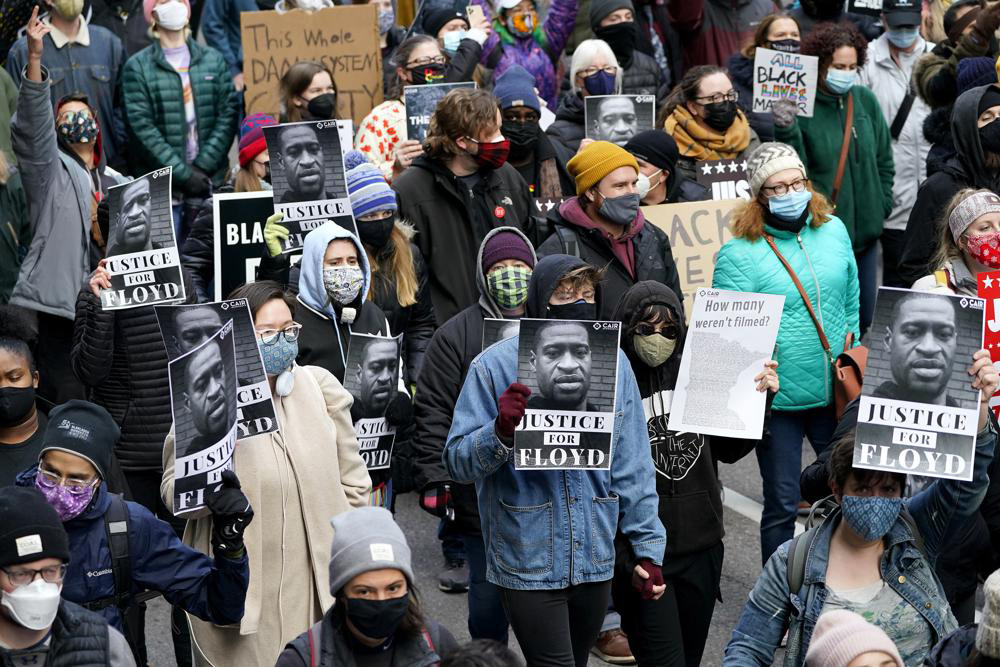
President Joe Biden weighed in by saying he believes the case is “overwhelming.” Biden told reporters he was only weighing in on the trial into the death of George Floyd, who died with Chauvin’s knee on his neck, because the jury in the case had been sequestered. He said he called Floyd’s family on Monday to offer prayers and “ can only imagine the pressure and anxiety they’re feeling.”
“They’re a good family and they’re calling for peace and tranquility no matter what that verdict is,” Biden said. “I’m praying the verdict is the right verdict. I think it’s overwhelming, in my view. I wouldn’t say that unless the jury was sequestered now.”
The president has repeatedly denounced Floyd’s death but has previously stopped short of weighing in on Chauvin’s trial, with White House officials saying it would be improper to speak out during active judicial proceedings. The White House has been privately weighing how to handle the upcoming verdict, including considering whether Biden should address the nation and dispatching specially trained community facilitators from the Justice Department, aides and officials told The Associated Press.
Floyd’s brother, Philonise Floyd, told NBC’s “Today” show that Biden “knows how it is to lose a family member … so he was just letting us know that he was praying for us and hoping that everything would come out to be OK.”
Psaki on Tuesday said Biden was “not looking to influence” the outcome and would weigh in further once the jury reached a verdict. Biden has yet to deliver expansive remarks as president on race and policing.
Pressed to expand on the president’s remarks, Psaki added, “I’m not going to provide additional analysis on what he meant.”
The White House, meanwhile, was stepping up preparations for the upcoming verdict. Psaki said administration officials have been in contact with leaders in Minnesota and in other cities and states that saw unrest after Floyd’s death last year. The FBI and the U.S. attorney’s office in Minnesota have been working with local officials to support law enforcement as they prepare for the possibility of unrest after the verdict, officials said.
The Justice Department has also dispatched specially trained community facilitators, according to a senior Justice Department official. The official could not discuss the plans publicly and spoke to the AP on condition of anonymity.
The officials, part of the Justice Department’s Community Relations Service, tout themselves as “America’s Peacemaker” for mediating disputes in communities and holding listening sessions to help prevent future conflicts.
A federal civil rights investigation, separate from the trial, remains ongoing. Several witnesses were subpoenaed earlier this year to appear before a federal grand jury considering charges against Chauvin.
The Justice Department’s civil rights investigation has been focused on Chauvin and some of the witnesses, including other officers who worked with Chauvin, people familiar with the matter have told the AP.
The verdict is a test for Biden, who has pledged to help combat racism in policing, helping African Americans who supported him in large numbers last year in the wake of protests that swept the nation after Floyd’s death and restarted a national conversation about race. But he also has long projected himself as an ally of police, who are struggling with criticism about long-used tactics and training methods and difficulties in recruitment.
The racially diverse jury — anonymous and sequestered from the outside world — resumed deliberations in the morning as lawmakers and fellow citizens alike delivered their own opinions about the combustible case that triggered protests, scattered violence and a reckoning over racism in the U.S.
“It shouldn’t be really even questioned whether there will be an acquittal or a verdict that doesn’t meet the scale of the crime that was committed,” Rep. Ilhan Omar, a Democrat, said in Brooklyn Center, a suburb just outside Minneapolis. The congresswoman said the Chauvin case looks open-and-shut.
Guilty verdicts could mark a turning point in the fight for racial equality, she said.
“We are holding on to one another for support. Hopefully this verdict will come soon and the community will start the process of healing,” Omar said.
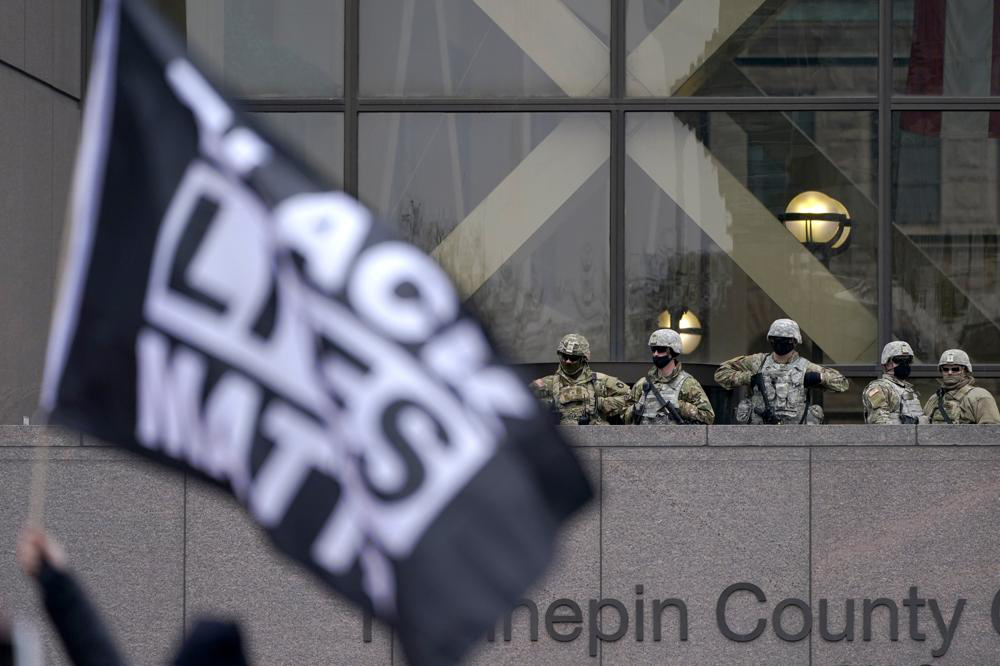
Prosecutors argued that Chauvin squeezed the life out of Floyd last May when the white officer knelt on or near the 46-year-old Black man’s neck for 9 1/2 minutes. The defense contended that the now-fired white officer acted reasonably and that a heart condition and illegal drug use led to Floyd’s death.
Chauvin, 45, is charged with second-degree murder, third-degree murder and second-degree manslaughter The most serious charge carries up to 40 years in prison.
Ahead of a verdict, hundreds, and perhaps thousands, of stores and other buildings have been boarded up across the city, from Absolute Bail Bonds to glass-walled downtown office towers to Floyd’s 99 Barbershop.
More than 3,000 National Guard soldiers, along with police officers, state police, sheriffs deputies and other law enforcement personnel have flooded the city in recent days, with a verdict looming . But in the city that has come to epitomize America’s debate over police killings, there are places today in Minneapolis that can feel almost like a police state.
Concrete barriers, chain-link fences and barbed wire now ring parts of downtown Minneapolis so that authorities can quickly close off the courthouse where the trial is being held. It’s become normal in recent days to pass convoys of desert-tan military vehicles on nearby highways, and stumble across armed men and women standing guard.
Behind all the security are the days of violence that began with protests over Floyd’s death. Minneapolis Mayor Jacob Frey and Minnesota Governor Tim Walz faced withering criticism for not stepping in quicker to deploy the National Guard. City officials estimate the city suffered roughly $350 million in damage, mostly to commercial properties.
“They’re between a rock and hard place,” said Eli Silverman, professor emeritus at the John Jay College of Criminal Justice and a longtime scholar of policing. “You don’t want to overmilitarize and make it appear that you’ve converted a sovereign state into a police state. But on the other hand, you have to be prepared, too,” in case protests flare again.
The city has also been on edge in recent days over the deadly police shooting of a 20-year-old Black man, Daunte Wright, in Brooklyn Center on April 11.
Brooklyn Center Mayor Mike Elliott joined a group of residents Tuesday to call for transparency and accountability in policing.
The mayor said he has met with Wright’s family several times and vowed to “do all that’s within our power to make sure that we are implementing the kind of changes that would prevent another Daunte.”
“What this community is saying is that his life is going to continue to matter,” Elliott said.
After the jury got the Chauvin case Monday, Judge Peter Cahill rejected a defense request for a mistrial based in part on comments from California Rep. Maxine Waters, who said “we’ve got to get more confrontational” if Chauvin isn’t convicted of murder.
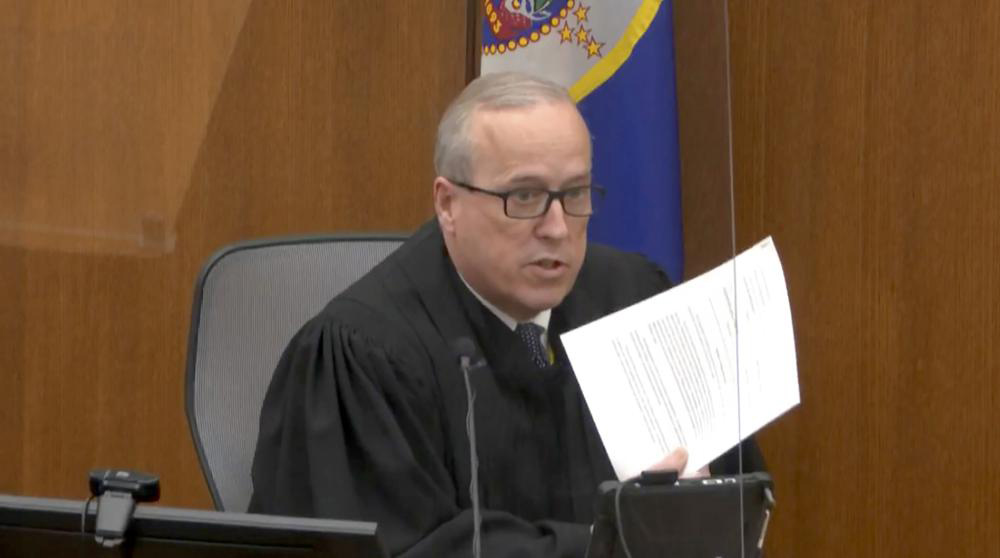
The judge called her comments “abhorrent” and “disrespectful to the rule of law and to the judicial branch” and told Chauvin’s attorney that Waters “may have given you something on appeal that may result in this whole trial being overturned.”
Speaking of politicians in general, the judge said, “I think if they want to give their opinions, they should do so in a respectful and in a manner that is consistent with their oath to the Constitution to respect a coequal branch of government. Their failure to do so, I think, is abhorrent.”
On Monday, Cahill ordered that jurors be sequestered in an undisclosed hotel during their deliberations and instructed them to avoid all news about the case.
Still, two defense attorneys in Minnesota said they consider a successful appeal over remarks like Waters’ or Biden’s extremely unlikely.
“Anybody who thinks undue publicity is going to get a case reversed in this day and age is just wrong,” said Joe Friedberg, who is unconnected to the case. “Just from a pragmatic standpoint, with social media, I don’t think it can ever be done again.”
Brock Hunter, past president of the Minnesota Association of Criminal Defense Lawyers, said a successful appeal would be unlikely unless there were direct evidence that Waters’ statements affected jurors.
Prosecutors fought hard to add a third-degree murder charge against Chauvin but a conviction on that charge alone could set up a problematic scenario for them. That’s because another fired Minneapolis officer found guilty of third-degree murder has a pending appeal before the state Supreme Court — and if his conviction is overturned, it could mean a Chauvin conviction would fall, too. Chauvin is charged with second- and third-degree murder and second-degree manslaughter. The jury can convict Chauvin of some, none or all three of the charges. The risk is that if the jury acquits him of second-degree murder but agrees he is guilty of third-degree murder, a murder conviction might not ultimately stick.
The interpretation of Minnesota’s third-degree murder statute is being challenged in the case of former Minneapolis Officer Mohamed Noor. He was convicted in the 2017 shooting death of Justine Ruszczyk Damond, a dual citizen of Australia and the U.S. who was killed after she called 911 to report a potential sexual assault behind her home.
At issue is a short phrase in the statute: that the defendant’s conduct must be found to be “eminently dangerous to others.”
The original charges against Chauvin included third-degree murder, but Judge Cahill threw out that count in October, citing the word “others” — plural — in that phrase. Cahill said there was no evidence Chauvin’s actions endangered anyone beyond Floyd.
Subsequently, a Minnesota appeals court in February rejected similar legal reasoning in Noor’s case, ruling that a third-degree murder conviction can be sustained even if the action that caused a death was directed at just one person. Cahill then reinstated the charge against Chauvin, however, Noor has taken his case to the Minnesota Supreme Court, which will hear arguments in June.
If the jury in the Chauvin case were to come back with a conviction on third-degree murder only, Chauvin “obviously could never be tried again on the other charges” because of his protection against double jeopardy, said Mike Brandt, a local defense attorney who has been closely following Chauvin’s trial.
And if the Minnesota Supreme Court rules in Noor’s favor, that could help Chauvin get his own conviction thrown out, and then Chauvin “would basically walk,” according to Brandt.
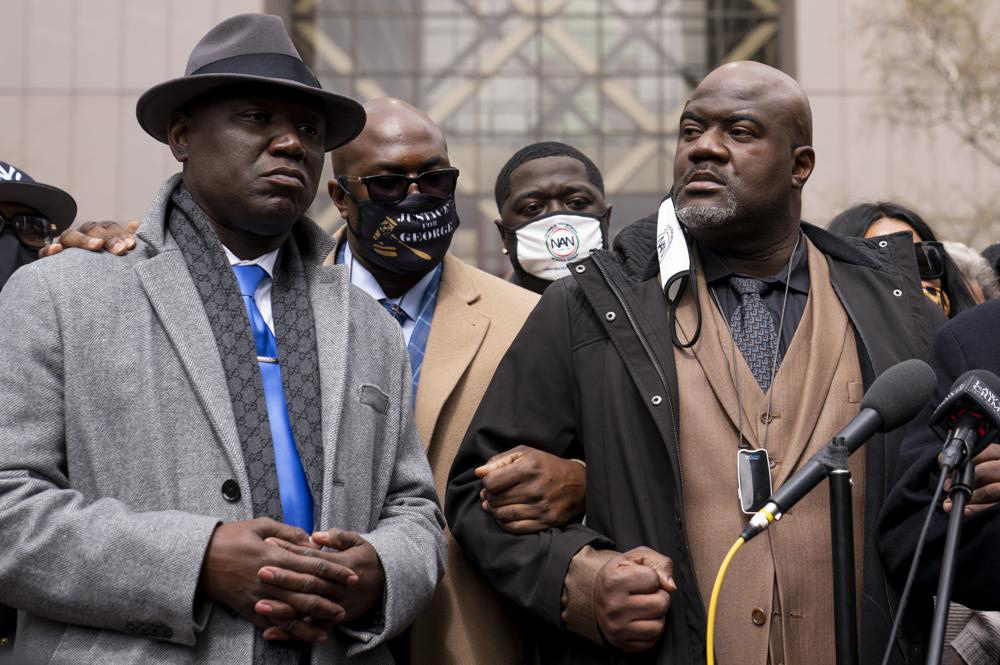
Ted Sampsell-Jones, a professor at the Mitchell Hamline School of Law in St. Paul, Minnesota, agreed it would be a “nightmare scenario” if Chauvin were acquitted of second-degree murder and convicted of third-degree, and the Supreme Court then reversed Noor’s conviction.
“If the Minnesota Supreme Court were to reverse Noor’s third-degree murder conviction, that would almost certainly invalidate Chauvin’s as well,” Sampsell-Jones said. “But — that is quite unlikely all around.”
Sentencing guidelines call for four years in prison on the manslaughter charge versus 12 1/2 years on each of the murder counts.
(AP)



